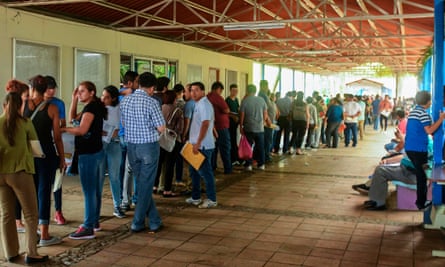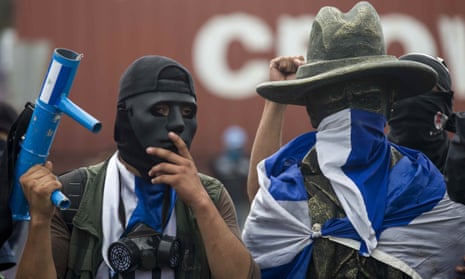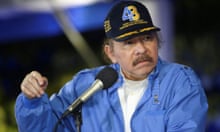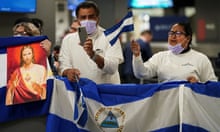Protest leaders have stepped up their campaign to force Nicaragua’s embattled president, Daniel Ortega, from office and halt a wave of deadly repression with a 24-hour nationwide strike designed to tighten the economic screws on the one-time revolutionary hero.
Student leader Valeska Valle said the stoppage – which began at midnight on Wednesday and is being led by a “civil alliance” of Ortega critics including students, religious leaders and business people – was intended to hasten “the peaceful exit” of the president and his unpopular wife and vice-president, Rosario Murillo.
“This strike is about our future and we know the people will support it,” said Valle, 22, who has emerged as one of Nicaragua’s most prominent student leaders since anti-government protests erupted on 18 April.
“We know the national strike will not be decisive in overthrowing this regime,” Valle added. “But it is a way of applying pressure” to end the “massacre” she accused Ortega’s “oppressive” government of perpetrating on protesters.
Human rights activists say at least 148 people have been killed since the unrest began in April, many gunned down by security forces or masked members of shadowy paramilitary gangs.
Campesino leader Medardo Mairena told the opposition news group Confidencial the strike would heap more pressure on Ortega: “The people no longer want him in power.”
As the strike took hold on Thursday, the streets of Nicaragua’s capital Managua and other cities were all but deserted. Activists around the country tweeted pictures of empty streets.
A las 8.18 am de hoy 14 de junio así lucen : Carretera Managua a Masaya, ciudad Ocotal y mercado Israel Lewites en Managua.#ParoPorNicaragua.
— ProtestaNica (@ProtestaNica) June 14, 2018
Fuera Ortega y Murillo!! pic.twitter.com/UiJjJEqq5h
The current unrest – which has prompted the British government to warn against all but essential travel to the country – started as a student-led protest against controversial pension reforms Ortega later scrapped. But it has since expanded into a nationwide revolt against the 72-year-old Sandinista.
Nicaragua’s capital, Managua, is now decked in graffiti maligning a man once feted by the global left for his David versus Goliath cold war struggle with Washington. Several towns, including the one-time Sandinista stronghold of Masaya, are in a state of almost total paralysis, with masked rebels erecting roadblocks known as tranques and driving out authorities.

Ortega, who was democratically elected in 2006 but is accused of an increasingly authoritarian rule, has ignored calls to step down or bring forward elections scheduled for 2021.
Enrique Bolaños, Ortega’s predecessor as president and a longstanding political rival, told the Guardian he suspected his successor was clinging to power for fear of being prosecuted for killings committed by security forces and paramilitary gangs.
“So he must be like Ceaușescu in Romania or like Maduro in Venezuela and do everything to stay in power because the worst thing [he] can do is quit,” said Bolaños, Nicaragua’s president from 2002 to 2007.
“Say you are Ortega, what would you do?” Bolaños added. “[Be] like Anne Boleyn [and] put [your] head on the guillotine? … He’s not an idiot.”
Ortega’s government has refused to accept responsibility for the mounting body count blaming the bloodshed on “criminals”. On Tuesday Murillo conceded Nicaragua was experiencing “difficult times” and called on God to stop the violence, according to El 19, a state-controlled newspaper.
Catholic leaders, who are part of the coalition to remove Ortega, said it was the president who now needed to act to prevent civil war.
“He should now think about how he might go down in Nicaraguan history,” said Bishop Rolando Álvarez.









